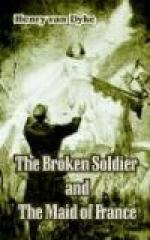The Meeting at the Spring
Along the old Roman road that crosses the rolling hills from the upper waters of the Marne to the Meuse, a soldier of France was passing in the night.
In the broader pools of summer moonlight he showed as a hale and husky fellow of about thirty years, with dark hair and eyes and a handsome, downcast face. His uniform was faded and dusty; not a trace of the horizon-blue was left; only a gray shadow. He had no knapsack on his back, no gun on his shoulder. Wearily and doggedly he plodded his way, without eyes for the veiled beauty of the sleeping country. The quick, firm military step was gone. He trudged like a tramp, choosing always the darker side of the road.
He was a figure of flight, a broken soldier.
Presently the road led him into a thick forest of oaks and beeches, and so to the crest of a hill overlooking a long open valley with wooded heights beyond. Below him was the pointed spire of some temple or shrine, lying at the edge of the wood, with no houses near it. Farther down he could see a cluster of white houses with the tower of a church in the center. Other villages were dimly visible up and down the valley on either slope. The cattle were lowing from the barnyards. The cocks crowed for the dawn. Already the moon had sunk behind the western trees. But the valley was still bathed in its misty, vanishing light. Over the eastern ridge the gray glimmer of the little day was rising, faintly tinged with rose. It was time for the broken soldier to seek his covert and rest till night returned.
So he stepped aside from the road and found a little dell thick with underwoods, and in it a clear spring gurgling among the ferns and mosses. Around the opening grew wild gooseberries and golden broom and a few tall spires of purple foxglove. He drew off his dusty boots and socks and bathed his feet in a small pool, drying them with fern leaves. Then he took a slice of bread and a piece of cheese from his pocket and made his breakfast. Going to the edge of the thicket, he parted the branches and peered out over the vale.
Its eaves sloped gently to the level floor where the river loitered in loops and curves. The sun was just topping the eastern hills; the heads of the trees were dark against a primrose sky.
In the fields the hay had been cut and gathered. The aftermath was already greening the moist places. Cattle and sheep sauntered out to pasture. A thin silvery mist floated here and there, spreading in broad sheets over the wet ground and shredding into filmy scarves and ribbons as the breeze caught it among the pollard willows and poplars on the border of the stream. Far away the water glittered where the river made a sudden bend or a long smooth reach. It was like the flashing of distant shields. Overhead a few white clouds climbed up from the north. The rolling ridges, one after another, infolded the valley as far as eye could see; pale green set in dark green, with here and there an arm of forest running down on a sharp promontory to meet and turn the meandering stream.




